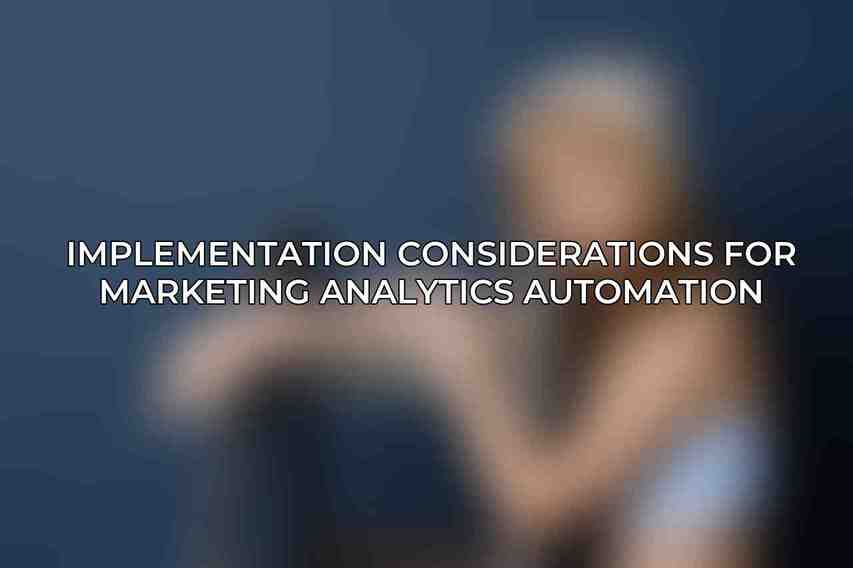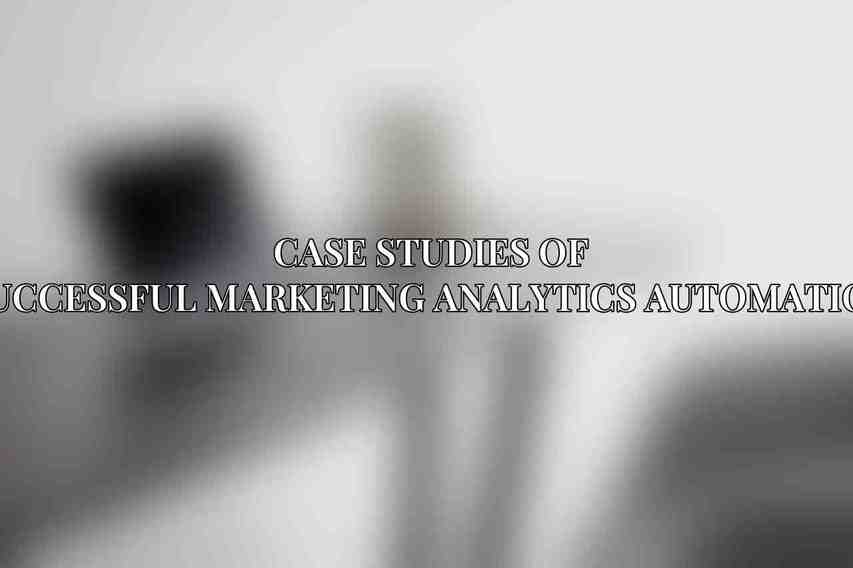marketing analytics plays a crucial role in helping businesses make data-driven decisions to enhance their marketing strategies. by analyzing data from various marketing channels and campaigns, organizations can gain valuable insights into customer behavior, preferences, and trends. Automation further amplifies the power of marketing analytics by streamlining processes, reducing manual tasks, and enabling personalized marketing efforts at scale.
Marketing analytics involves the practice of measuring, managing, and analyzing marketing performance to maximize its effectiveness and optimize return on investment (ROI). It provides valuable insights into customer behavior, market trends, and campaign performance, allowing businesses to make informed decisions and tailor their marketing strategies for better results. With the rapid advancements in technology, the use of marketing analytics tools has become essential for staying competitive in the modern business world.
The role of automation in enhancing marketing analytics cannot be understated. Automation tools streamline data collection, analysis, and reporting processes, saving time and resources while improving accuracy and efficiency. By automating repetitive tasks and workflows, marketers can focus on strategic initiatives and leverage data-driven insights to drive growth and revenue.
Overview of Top Marketing Analytics Tools
Here is a breakdown of some of the top marketing analytics tools that offer advanced features and seamless integration with automation platforms:
Google Analytics
Google Analytics is one of the most widely used tools for web analytics, providing comprehensive insights into website traffic, user behavior, and campaign performance. Key features of Google Analytics include audience analysis, campaign tracking, and conversion optimization. Moreover, Google Analytics can be seamlessly integrated with automation platforms such as Zapier and IFTTT for automated data sharing and workflow automation.
Adobe Analytics
Adobe Analytics is a robust analytics solution that offers advanced features for customer journey analysis, cross-channel reporting, and predictive analytics. By integrating Adobe Analytics with automation platforms like Marketo and Salesforce, marketers can automate personalized marketing campaigns and track performance across multiple touchpoints. Read more on Best Strategies for Leveraging Marketing Analytics
Mixpanel
Mixpanel is a powerful analytics tool focused on event tracking, cohort analysis, and user engagement monitoring. With Mixpanel, businesses can gain deep insights into user behavior and optimize their product offerings accordingly. The platform also integrates seamlessly with automation platforms such as Segment and Autopilot for automated data synchronization and campaign management.
Amplitude
Amplitude is a behavioral analytics platform that helps businesses understand user behavior, conduct A/B testing, and track revenue impact. Through integrations with automation platforms like Intercom and HubSpot, marketers can automate customer communications and track conversions more effectively.
Kissmetrics
Kissmetrics is a customer analytics platform that focuses on customer relationship management, funnel analysis, and email analytics. By integrating Kissmetrics with automation platforms such as Salesforce and Shopify, businesses can automate customer segmentation, personalized messaging, and campaign tracking for improved marketing performance.
Benefits of Integrating Marketing Analytics with Automation
The integration of marketing analytics with automation offers a wide range of benefits for businesses looking to enhance their marketing efforts:
- Enhanced decision-making through automated data analysis
- Improved customer experience with personalized automated campaigns
- Increased efficiency in marketing operations
- Optimized marketing spend with data-driven allocation
- Improved ROI through automated performance monitoring
By leveraging the power of automation to analyze and act on marketing data in real-time, businesses can make quicker, more informed decisions and deliver personalized experiences that drive engagement and loyalty.
Implementation Considerations for Marketing Analytics Automation

When implementing marketing analytics automation, organizations should consider the following factors to ensure a successful integration:
Data collection and integration
Ensuring that data is collected accurately from various sources and integrated seamlessly into the analytics and automation platforms is crucial for generating reliable insights and enabling automation workflows.
Automation platform selection
Choosing the right automation platform that aligns with the organization’s marketing goals and technical requirements is essential for optimizing automation processes and improving efficiency.
Integration setup and testing
Thoroughly testing the integration between marketing analytics tools and automation platforms is necessary to identify any issues or discrepancies early on and ensure a smooth transition to automated workflows.
Ongoing monitoring and optimization
Continuously monitoring the performance of automated marketing campaigns and analyzing key metrics allows businesses to identify areas for improvement, optimize processes, and maximize ROI over time.
Case Studies of Successful Marketing Analytics Automation

Let’s explore some real-world examples of organizations leveraging marketing analytics automation to drive results:
Example 1: E-commerce company using Adobe Analytics and Marketo
By combining Adobe Analytics for in-depth customer journey analysis with Marketo for automated email marketing, an e-commerce company was able to personalize communication with customers, leading to a significant increase in click-through rates and conversions.
Example 2: Software company using Mixpanel and Segment
A software company integrated Mixpanel for user engagement tracking and Segment for data synchronization, enabling them to analyze user behavior in real-time and optimize their onboarding process for higher product adoption and customer satisfaction.
Example 3: Non-profit organization using Google Analytics and Zapier
A non-profit organization automated donor outreach campaigns by integrating Google Analytics for tracking website interactions and Zapier for automating email communications based on user interactions. This resulted in a substantial increase in donor engagement and contributions.
Best Practices for Marketing Analytics Automation
To make the most of marketing analytics automation, organizations should follow these best practices:
- Set clear goals and objectives to guide automation initiatives
- Focus on actionable insights that drive decision-making and optimization
- Monitor and adapt regularly based on performance data and feedback
- Foster a data-driven culture to encourage collaboration and knowledge sharing
- Leverage machine learning and AI for advanced automation and predictive analytics
By adhering to these best practices, businesses can unlock the full potential of marketing analytics automation and gain a competitive edge in this fast-paced digital world.
the combination of advanced marketing analytics tools and automation platforms provides businesses with the tools and capabilities to leverage data effectively, automate marketing processes, and drive meaningful results. By integrating marketing analytics with automation, organizations can enhance decision-making, improve customer experiences, increase operational efficiency, optimize marketing spend, and ultimately achieve a higher return on investment. Embracing automation in marketing analytics is not just a trend but a strategic necessity for staying ahead in a data-driven world.
Frequently Asked Questions
What are marketing analytics tools?
Marketing analytics tools are software platforms or programs that help businesses track, measure, and analyze their marketing performance. These tools provide insights into various aspects of marketing campaigns, such as customer behavior, ROI, and marketing effectiveness.
What are some benefits of using marketing analytics tools?
Some benefits of using marketing analytics tools include making data-driven decisions, improving campaign performance, enhancing customer experiences, increasing ROI, and gaining competitive advantage in the market.
What are some popular marketing analytics tools for smart automation?
Some popular marketing analytics tools for smart automation include Google Analytics, HubSpot, Adobe Analytics, Marketo, and Salesforce Marketing Cloud. These tools offer advanced features for data analysis, reporting, and automation.
How can marketing analytics tools help in streamlining marketing processes?
Marketing analytics tools can help in streamlining marketing processes by providing insights into customer preferences, behavior, and engagement with marketing campaigns. This data can be used to optimize campaigns, target specific audiences, and improve overall marketing strategy.
What should companies consider when choosing a marketing analytics tool?
When choosing a marketing analytics tool, companies should consider factors such as their specific marketing needs, budget, scalability of the tool, user-friendliness, integration capabilities with other systems, and level of customer support provided by the vendor.

